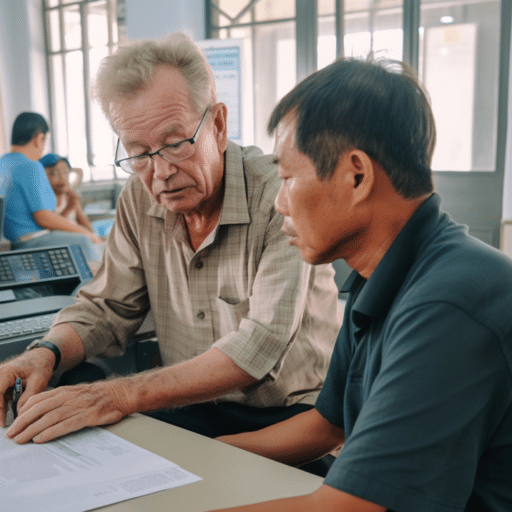The availability of Cambodia pension fund is one of the primary concerns for expatriates contemplating retirement in the country.
A pension fund can provide a stable source of income during retirement, supplementing other savings and investments. In this article, we will delve into the details of Cambodia’s pension fund options for expatriates and explore how they can secure their financial future while residing in the country.
If you want to invest as an expat or high-net-worth individual, which is what I specialize in, you can email me (advice@adamfayed.com) or use WhatsApp (+44-7393-450-837).
What is a Pension Fund?
A pension fund is a type of investment vehicle specifically designed to provide income during retirement. It is usually structured as a long-term investment plan, where individuals contribute a portion of their income throughout their working years, with the aim of building a substantial fund that can be accessed upon retirement.
The primary purpose of a pension fund is to ensure financial security and provide a regular income stream when individuals are no longer working.
How pension funds work
Pension funds typically operate by pooling contributions from multiple participants and investing those funds in various assets such as stocks, bonds, real estate, and other investment vehicles.
The accumulated funds grow over time through investment returns, allowing the pension fund to generate income that can be distributed to retirees. The funds are managed by professional fund managers or trustees who make investment decisions in accordance with the fund’s objectives and risk profile.
Benefits of having a pension fund for retirement
Having a pension fund offers several advantages for individuals planning for retirement. Some key benefits include:
- Regular Income: A pension fund provides a reliable source of income during retirement, ensuring that individuals can maintain their desired lifestyle without solely relying on social security benefits or personal savings.
- Tax Advantages: Contributions made to a pension fund often come with tax benefits, such as tax deductions or tax-free growth on investment returns, depending on the country’s tax laws.
- Professional Management: Pension funds are managed by financial experts who make informed investment decisions on behalf of participants. This professional management aims to maximize returns and mitigate risks, providing individuals with peace of mind regarding their retirement savings.
- Long-term Growth Potential: Pension funds are typically long-term investment vehicles, allowing individuals to benefit from the compounding effect over several decades. This long investment horizon provides the potential for substantial growth in the fund’s value.
- Retirement Security: By having a pension fund, individuals can feel more secure about their financial future, knowing that they have taken proactive steps to plan for retirement and build a nest egg that can support their needs.
The State of Retirement Planning in Cambodia
Retirement planning in Cambodia has gained significance in recent years due to the country’s growing popularity among expatriates seeking to settle or work in the region.
Expatriates, like Cambodian citizens, need to plan for their retirement to ensure financial stability and security in their later years. Understanding the state of retirement planning in Cambodia is crucial for expats to make informed decisions about their future.
Government initiatives play a vital role in addressing retirement needs in Cambodia. The government has recognized the importance of retirement planning and has taken steps to establish systems and policies to support its citizens.
The National Social Security Fund (NSSF) is one such initiative that offers social security coverage, including pension benefits, to Cambodian citizens. The NSSF provides a basic safety net for retirement but is primarily targeted at Cambodian citizens rather than expatriates.
However, expatriates in Cambodia have specific considerations when it comes to retirement planning. While they may not be eligible for the NSSF, they do have pension fund options available to them.
Expatriates can participate in the Cambodian pension system through various channels, including private pension providers.
Pension Fund Options for Expats in Cambodia
Expatriates in Cambodia have access to different pension fund options that can help them secure their financial future in retirement.
Expatriates can choose to contribute to the voluntary pension scheme offered by the National Social Security Fund (NSSF). This scheme allows expats to make contributions towards their retirement, although it may not provide the same level of benefits as it does for Cambodian citizens.
Private pension providers also operate in Cambodia and offer pension plans tailored specifically for expatriates. These providers offer a range of investment options and services to help expats accumulate funds for their retirement.
The Cambodian pension system
The Cambodian pension system is still in its early stages of development. While the NSSF primarily serves Cambodian citizens, it does accept voluntary contributions from expatriates, providing them with some form of retirement coverage.
The government is continuously working on expanding and improving the pension system to cater to the needs of both citizens and expatriates.
Private pension providers play a significant role in offering retirement planning options for expatriates in Cambodia. These providers offer more flexible and tailored pension plans that can align with the specific needs and preferences of expats.
They often provide a wider range of investment options, including local and international funds, to help expats diversify their retirement savings.
It’s essential for expatriates to carefully consider their options and seek professional advice when choosing a pension fund in Cambodia. Each individual’s circumstances may vary, and it’s crucial to understand the specific terms, benefits, and potential risks associated with different pension fund options.
Remember, proactive planning and diligent research can go a long way in ensuring a financially secure retirement, regardless of whether you’re a citizen or an expatriate in Cambodia.

Similar to Cambodian citizens, expats who participate in the pension system are required to make regular contributions towards their retirement fund.
Can Expats Participate in the Cambodian Pension Fund?
Expats residing in Cambodia often wonder whether they are eligible to participate in the country’s pension system. The answer is yes, expatriates can indeed participate in the Cambodian pension system, albeit with certain considerations and requirements.
To shed more light on this topic, let’s delve into the details:
Enrollment Process
To enroll in the Cambodian pension system, expats need to fulfill a few steps.
Firstly, they must obtain a valid work permit in Cambodia, as this is a prerequisite for participation. Once they have secured a work permit, they can proceed with the enrollment process.
Typically, the employer facilitates the registration process by submitting the necessary documents and employee details to the relevant government agency overseeing pensions.
Contributions
Similar to Cambodian citizens, expats who participate in the pension system are required to make regular contributions towards their retirement fund.
These contributions are deducted from the employee’s salary on a monthly basis. The employer also contributes a matching amount on behalf of the employee.
Tax-Deductibility
Expats may wonder whether their contributions to the Cambodian pension system are tax-deductible. It’s important to note that tax regulations can vary, and it is advisable to consult with a tax professional or seek guidance from the local tax authority to understand the specific tax treatment of pension contributions for expatriates in Cambodia.
Benefits and Withdrawal
Participating in the Cambodian pension system allows expats to build up a retirement fund that they can access upon meeting the eligibility criteria for retirement.
The retirement benefits are typically paid out in the form of a lump sum or as periodic payments, depending on the individual’s preference and the provisions of the pension scheme.
Regulation and Monitoring
The Cambodian pension system is regulated and monitored by the Ministry of Labor and Vocational Training, ensuring compliance and transparency.
This oversight helps safeguard the interests of expats participating in the pension system and provides assurance that their contributions are properly managed.
Seek Professional Advice
Given the complexities and potential variations in pension regulations, it is advisable for expats to seek professional advice from financial advisors or experts well-versed in Cambodian pension laws.
They can provide personalized guidance based on individual circumstances, ensuring expats make informed decisions about their retirement planning.
What are the eligibility criteria for expats to join the pension fund?
To join the pension fund in Cambodia as an expat, you must meet certain eligibility criteria. The eligibility requirements are as follows:
- Residency Status: Expats must possess a valid long-term visa or work permit to be eligible to participate in the Cambodian pension system. Generally, this means having a valid employment contract or business visa.
- Age Requirement: There is usually no specific age restriction for expats to join the pension fund. However, it is essential to note that the earlier you start contributing to the fund, the more time your investments will have to grow and accumulate for your retirement.
- Employment Status: Expats must be employed or self-employed in Cambodia to participate in the pension fund. This means having a formal job or owning a registered business in the country.
- Contribution Obligations: Expats are required to make regular contributions to the pension fund, usually through deductions from their salaries or income. The contribution rates may vary based on the income level and specific rules set by the pension provider.

Taking advantage of the tax deductibility of pension contributions can be a valuable strategy for expats to enhance their retirement savings while potentially reducing their tax obligations.
How does the Cambodian pension system differ for expats and citizens?
The Cambodian pension system operates differently for expats and citizens. Here are the key differences:
Coverage
The Cambodian pension system covers both citizens and eligible expats. However, the specific pension benefits and programs available to each group may differ.
Social Security Fund
Cambodian citizens contribute to the National Social Security Fund (NSSF), which provides social security benefits, including retirement pensions. Expats, on the other hand, may have different options available to them, including private pension providers.
Pension Contributions
Cambodian citizens are typically required to contribute a percentage of their salaries or wages to the NSSF, which forms the basis for their retirement benefits. For expats, the contribution requirements may vary depending on the pension scheme they join, whether it is through the NSSF or a private pension provider.
Benefit Portability
One significant difference between the pension system for expats and citizens is the portability of benefits. While Cambodian citizens can continue to receive their pensions even if they move abroad, the rules regarding the portability of pension benefits for expats may vary depending on the specific pension scheme and the country they relocate to.
Are expat contributions to the pension fund tax-deductible?
Yes, expat contributions to the pension fund in Cambodia are generally tax-deductible. When expats contribute to the pension fund, the amount contributed is deducted from their taxable income, reducing their overall tax liability.
The tax deductibility of expat contributions to the pension fund provides an additional incentive for individuals to save for retirement. By reducing the taxable income, expats can lower their tax burden while simultaneously building their retirement savings.
However, it is important to note that tax laws and regulations can change, so it is essential to consult with a tax professional or financial advisor to understand the specific tax implications and deductions related to pension contributions for expats in Cambodia.
Taking advantage of the tax deductibility of pension contributions can be a valuable strategy for expats to enhance their retirement savings while potentially reducing their tax obligations. It is always recommended to seek expert advice to ensure compliance with tax regulations and to optimize retirement planning in Cambodia.
Benefits of Joining a Private Pension Provider in Cambodia
Joining a private pension provider in Cambodia can offer several benefits to expatriates. Here are some advantages to consider:
Diversified Investment Options
Private pension providers typically offer a range of investment options, allowing expats to diversify their retirement savings. This diversification helps reduce risk and maximize potential returns over the long term.
Professional Management
Private pension providers have dedicated investment professionals who manage the funds on behalf of the participants. These experts have the knowledge and expertise to make informed investment decisions, ensuring that the pension funds are well-managed and optimized for growth.
Flexibility and Control
By joining a private pension provider, expats gain more control over their retirement savings. They can choose from different pension plans and customize their investment strategy according to their risk tolerance, financial goals, and time horizon. This flexibility empowers expats to align their retirement savings with their specific needs and preferences.
Portability
Private pension plans in Cambodia are often portable, allowing expats to take their accumulated pension savings with them if they decide to relocate to another country. This feature provides expatriates with greater flexibility and peace of mind, knowing that their retirement funds can move with them wherever they go.
Transferring Existing Pension Funds to Cambodia
Expats often wonder if they can transfer their existing pension funds to Cambodia. While the specifics may vary depending on individual circumstances and the regulations of the country where the pension fund is held, here is a general overview:
- Research and Consultation: Start by researching the regulations and requirements for transferring pension funds from your current country of residence. Seek advice from financial professionals, such as pension advisors or wealth managers, who can guide you through the process.
- Determine Transferability: Check if your current pension fund allows for transfers to international pension schemes. Some pension funds have restrictions or limitations on transferring funds abroad, so it’s crucial to understand the terms and conditions of your existing pension plan.
- Understand Tax Implications: Transferring pension funds may have tax implications in both your current country and Cambodia. Consult with tax advisors to assess the potential tax consequences and any tax treaties between the two countries that may affect the transfer process.
- Contact Cambodian Pension Providers: Reach out to Cambodian pension providers to inquire about their policies on accepting transfers from international pension funds. They will provide you with specific guidance on the required documentation and processes.
- Complete Transfer Process: Once you have gathered all the necessary information and documentation, follow the instructions provided by the pension providers to initiate the transfer. Be prepared for potential administrative procedures and processing time.

Pension funds in Cambodia are subject to strict regulations and monitoring to ensure the security and stability of the retirement system.
Fate of an Expat’s Pension Fund Upon Leaving Cambodia
When expatriates leave Cambodia, it’s natural to wonder what happens to their pension fund. Here’s an overview of the possible scenarios:
Withdrawal Options
Depending on the rules and regulations of the Cambodian pension system and the specific terms of your pension plan, you may have the option to withdraw your pension funds in a lump sum or receive periodic payments.
International Transfer
If you are moving to another country, you might be able to transfer your Cambodian pension funds to an eligible pension scheme in your new country of residence. Research the regulations of the destination country and consult with financial professionals to explore this option.
Deferred Retirement
In some cases, expatriates may choose to leave their pension funds in Cambodia and defer their retirement until they become eligible to receive the benefits. This can be beneficial if you plan to return to Cambodia or if the pension system allows for deferred retirement benefits.
How are pension funds in Cambodia regulated and monitored?
Pension funds in Cambodia are subject to strict regulations and monitoring to ensure the security and stability of the retirement system.
The regulatory framework is overseen by the Ministry of Labor and Vocational Training, specifically the National Social Security Fund (NSSF). The NSSF plays a crucial role in supervising and administering the pension funds in Cambodia.
The NSSF establishes and enforces regulations pertaining to the operation, management, and investment of pension funds. These regulations aim to protect the interests of pension fund participants, maintain transparency, and promote good governance within the pension industry.
To ensure compliance, the NSSF conducts regular audits and inspections of pension fund providers. They review the financial statements, investment portfolios, and administrative practices of these providers.
By monitoring the performance and adherence to regulations, the NSSF aims to safeguard the retirement savings of both Cambodian citizens and expatriates.
Additionally, the NSSF collaborates with other relevant government agencies and stakeholders to enhance the regulatory framework. They work closely with the Ministry of Economy and Finance, the Securities and Exchange Commission of Cambodia (SECC), and other regulatory bodies to strengthen the oversight and governance of pension funds.
Furthermore, the NSSF ensures that pension fund providers maintain proper risk management strategies. This includes setting guidelines on investment diversification, asset allocation, and risk assessment.
Are there any alternatives to the Cambodian pension fund for expats?
While the Cambodian pension fund provides a viable retirement planning option for expatriates, there are alternative avenues to consider as well. Expats have the flexibility to explore other retirement planning options based on their individual preferences and circumstances. Here are a few alternatives to consider:
Private Pension Plans
Expats can opt for private pension plans offered by international financial institutions operating in Cambodia. These plans often provide more customization options and investment choices tailored to the expat’s specific needs.
Offshore Retirement Accounts
Expatriates can also explore offshore retirement accounts, such as Individual Retirement Accounts (IRAs) or Self-Invested Personal Pensions (SIPPs). These accounts are managed outside Cambodia and offer potential tax advantages and investment flexibility.
Real Estate Investment
Investing in real estate properties can be a long-term retirement strategy for expats. Purchasing properties in Cambodia or in their home country can generate rental income or provide capital appreciation over time.
Personal Savings and Investments
Expats can build their retirement nest egg by diligently saving and investing in diverse financial instruments, such as stocks, bonds, mutual funds, or exchange-traded funds (ETFs). This approach requires disciplined financial planning and regular contributions to ensure future financial security.
Conclusion
In conclusion, Cambodia does have pension fund options for expatriates, providing them with an avenue to secure their financial future during retirement. While the Cambodian pension system primarily caters to its citizens, expats can still participate and benefit from private pension providers operating in the country.
Retirement planning is crucial for individuals living abroad, as it ensures financial stability and peace of mind in the later stages of life. By actively exploring and utilizing the available pension fund options, expats can contribute to their retirement savings and enjoy the benefits of a well-structured retirement plan.
Pained by financial indecision?

Adam is an internationally recognised author on financial matters with over 830million answer views on Quora, a widely sold book on Amazon, and a contributor on Forbes.



